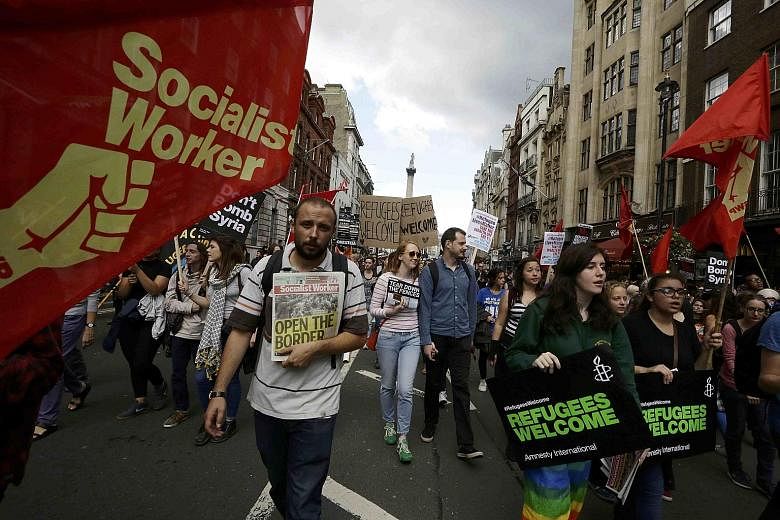LONDON • Tens of thousands of people staged rallies across Europe yesterday in solidarity with migrants fleeing violence and war, urging their governments to do more to help amid a humanitarian crisis that has seen the region divided on a suitable response.
In one of dozens of events planned across Europe, tens of thousands of people marched in London, brandishing placards reading "Open the Borders". In Copenhagen, Denmark, some 30,000 took to the streets, according to police. Demonstrations were also held in cities in Germany, Spain, France and elsewhere.
At the London protest, a boy dressed as Paddington Bear had a sign saying: "Paddington Bear Was A Refugee."
"It's time to speak out against the deadly borders that have been enacted in our name. People all over Europe are organising resistance and solidarity in their towns and cities," organisers of the #EuropeSaysWelcome initiative said on social media.
But there were also rival anti-migrant rallies staged in Poland, the Czech Republic and Slovakia, a testament to divisions within Europe on the issue.
The influx has exposed deep rifts within the European Union (EU), with "frontline" states Italy, Greece and Hungary struggling to cope and European Commission proposals for sharing 160,000 of the new arrivals in a quota scheme facing resistance among eastern members.
Last Friday, Hungarian Prime Minister Viktor Orban launched his own broadside, saying Europe's leaders are "living in a dream world" with "no clue" about the dangers and scale of the problem, while denying that the migrants are, strictly speaking, refugees.
"These migrants are not coming our way from war zones, but from camps in Syria's neighbours: from Lebanon, Jordan and Turkey... So these people are not fleeing danger and don't need to be scared for their lives," he told Germany's Bild daily in an interview.
He said he would propose to his EU counterparts that the bloc provide €3 billion (S$4.8 billion) to Lebanon, Jordan and Turkey, "and more if necessary - until the flow of migrants is stopped".
The idea that quotas would work is an "illusion", he said. "(Can) we really stop the migrants going where they want? Who is going to keep them in Estonia, Slovenia or Portugal if they want to go to Germany?"
Austrian Chancellor Werner Faymann, whose country has seen thousands of migrants enter from Hungary in recent days, with all but a few passing through, was quoted yesterday comparing Hungary's treatment of migrants to the Nazi era.
"Piling refugees on trains in the hopes that they go far, far away brings back memories of the darkest period of our continent," Mr Faymann told German weekly Spiegel.
Last Friday, Berlin's foreign minister pressed his eastern European counterparts in Prague to do more, saying the crisis could be "the biggest challenge for the EU in its history". But his appeal fell on deaf ears, with Slovakian Foreign Minister Miroslav Lajcak saying he wanted a solution "that is not imposed" but "made jointly".
"Migrants don't want to stay in Slovakia," he said.
Denmark's right-wing government also said it would not take part in the quota scheme. Like Britain and Ireland, the Scandinavian country has an opt-out on the 28-nation EU's asylum policies.
AGENCE FRANCE-PRESSE
SEE INSIGHT
Migrants driven by desperation and hope

